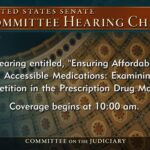Unintended Consequences of Limiting PBMs
Alex Brill
As Congress stumbles toward a government shutdown, health policy legislation continues to simmer in the background. While the House of Representatives delayed a vote on wide-ranging transparency legislation targeting pharmacy benefit managers (PBMs), hospitals, and others, the House proceeded with yet another hearing into one of their favorite targets: PBMs.
Polls show that voters are concerned with the affordability of healthcare, but policymakers seem more interested in policies limiting the functionality and flexibility of those tasked with pharmacy benefit design. PBMs are hired by health insurance plans and large employers to oversee prescription drug utilization for beneficiaries. Members of Congress have recently embraced the notion—pushed by some in the pharmaceutical supply chain—that PBMs are responsible for high drug prices, despite evidence to the contrary. Proposed legislation focused on PBM reforms—such as “delinking” PBM compensation from a drug’s list price or banning certain contracting arrangements that PBMs offer clients—does nothing to address drug prices and may raise pharmaceutical spending overall.
MGA explores these issues and others in a recent white paper, “Understanding the Role of PBMs in the US Drug Pricing Debate.” After explaining the value of PBMs in the pharmaceutical supply chain, the paper looks at the consequences of limiting the tools and incentives for PBMs to drive savings for their clients by negotiating prices with drugmakers.
MGA’s findings are in line with recent research published by University of Chicago Professor Casey Mulligan, who examined the impact of delinking proposals. As Mulligan explains:
Proposed “delinking” legislation would . . . significantly change drug pricing and utilization and shift billions of dollars annually from patients and taxpayers to drug manufacturers and retail pharmacy companies. Annual federal spending on Medicare Part D premiums would increase $3 billion to $10 billion plus any concomitant increase in Medicare subsidies for out-of-pocket expenses. All of these consequences stem from the fact that PBMs are hired to obtain rebates and discounts but would no longer be compensated based on their results.
Ironically, Congress is sitting on legislation that would yield lower drug prices by banning drug manufacturers’ anticompetitive tactics that keep generic and biosimilar drugs from entering the market.












